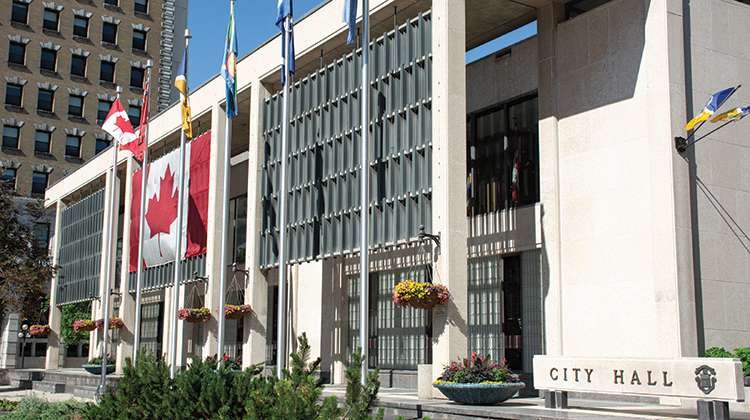By Jeremy Davis
Over the course of the 2022 Civic Election, the Winnipeg Regional Real Estate Board was proud to play an active role in the democratic process by interviewing all of the mayoral candidates in the Winnipeg election race on issues of importance to housing and the growth of our city. With a vested interest in issues important to real estate and development in our market region, we continue to follow activities at City Hall and last week, the budget was tabled.
Mayor Gillingham and his Chair of Finance, Councillor Jeff Browaty, tabled the City of Winnipeg’s fourth and final installment of this year’s edition of the multi-year balanced budget, the Preliminary 2023 Balanced Budget Update.
There weren’t many surprises in this year’s Budget Update but it was good to see Mayor Gillingham taking steps toward implementing campaign promises like the development of Neighbourhood Action Teams, funding to support the planning of two trade routes, the Chief Peguis Trail extension and Kenaston widening, restoring Winnipeg Transit service to 100%, funding more active transportation routes and 25% more funding to 311 to help reduce wait times.
Some other highlights include:
• Nearly $156M for road renewals
• $26.3M toward Winnipeg’s tree canopy
• $18M to begin work on a nutrient removal plan for the North End Sewage Treatment Plant
• Annualized grant funding of $250,000 for the Downtown Community Safety Partnership
• An annual increase of $1M for additional 24/7 safe spaces for unhoused people
• $2M to maintain bolster staffing levels to ensure timely processing of permits
The Preliminary 2023 Balanced Budget Update now begins its journey through the Committee process and then to Council.
In 2019, former Mayor Brian Bowman and then-Chair of Finance, Councillor Scott Gillingham, initiated the City’s first-ever multi-year balanced budget process.
At its inception, the multi-year balanced budget process was undertaken as a way to chart a sustainable plan into the future with the input of Councillors, all City departments and the public. This input would then be used to help create recommendations to the budget process and was gathered months in advance of the preliminary budget tabling.
City departments were asked to plan annual operating budgets and capital investments that were limited to sustainable, four-year targets largely restricted to the forecasted rate of inflation. The departments were then asked to present these plans at the appropriate Standing Policy Committee who would then provide multi-year recommendations on how to proceed within those targets. Executive Policy Committee received input from all Standing Policy Committees and was tasked with drafting and tabling operating and capital budgets, as is required under provincial legislation. The tabled preliminary budget proceeded through the traditional process of review, starting with the Standing Policy Committees including delegations, a Special Meeting of Executive Policy Committee to again hear from delegations, and a final Executive Policy Committee meeting that drafts the final recommendations with the operating and capital budgets for Council’s consideration. Opportunities for public input were provided multiple times throughout the process.
The drafting of a multi-year balanced budget required more effort at the start of the process to identify a sustainable and balanced 4-year plan, and many critical and difficult decisions were made at the onset. However, no crystal ball could have predicted the unique challenges that would lie in the years ahead and this multi-year balanced budget process certainly saw its share of unique challenges over the following four years.
In the midst of the initial process in 2019, Winnipeg and the surrounding areas were the location of an unprecedented weather event that downed trees and left many without power for many days. Some coined this “treemageddon” or the “tree apocalypse” as Winnipeg’s treasured tree canopy was decimated by a heavy, wet snow that had not been seen before. Little did Winnipeg know at the time that this was the first of three unprecedented events that would occur over the course of this multi-year budget process. In early 2020, the world was thrust into an unprecedented global health crisis like no other seen in a century with the onset of the pandemic that carried massive health, safety and financial consequences. Finally, 2022 became the wettest year on record in Winnipeg with an unprecedented level of snow that had a tremendous impact on the City budget.
The multi-year balanced budget process was certainly put through an ‘unprecedented’ testing process, and given the financial uncertainty that accompanied the three unprecedented events that ensued, it provided a stable foundation during unstable times.
The process gave departments multi-year visibility on budgets and appear to be headed towards alignment with the new Strategic Priorities Action Plan which will create even greater alignment between the will of council, and the residents they represent, with the public service.
The multi-year balanced budget has proven itself as a worthy addition the City of Winnipeg’s annual budget process, and during comments made after tabling the Preliminary 2023 Balanced Budget Update to the 2020-2023 Multi-Year balanced budget, it was good to see Mayor Gillingham signal the possibility of a continuation of this process into the future.
Stable, sustainable budgeting at the municipal level is important because it can ensure value for property owners who fill a municipality’s property tax base. A low cost of living, one of the lowest average municipal tax bills among major cities in Canada, and a consistently affordable real estate market continue to help make Winnipeg an attractive place to live, work and play.
I look forward to seeing how this year’s budget process unfolds and I encourage any residents who want to provide feedback, either in writing or in person, to follow the instructions on the Preliminary 2023 Balanced Budget Update website at: https://www.winnipeg.ca/budget2023
Jeremy Davis is the Winnipeg Regional Real Estate Board’s Director External Relations & Market Intelligence.



